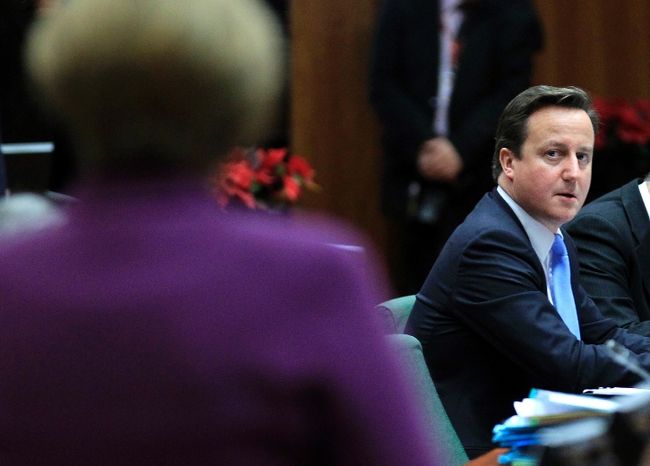Exactly 20 years to the day since European leaders drafted the Maastricht Treaty that created the European Union (EU), British Prime Minister David Cameron stood alone as he refused to endorse a new European fiscal pact agreed to by all other member states. But no matter the severity of the economic troubles in the Eurozone, this was not an economic decision; Cameron chose to isolate the United Kingdom from its European neighbors for political reasons. He was not reacting to Europe, but to the Euroskeptics in his own Conservative Party at home. And it was a decision that will push the UK further to the peripheries of European decision-making for many years to come.
It should come as no surprise that Cameron has pandered to the Euro-skeptic wing of his party. It is the most high-profile, but not the first, time he has played to his crowds. When he took the British Conservative Party out of the center-right grouping of the European Parliament to join forces with a disjointed right-wing gaggle that included nationalistic, homophobic and anti-semitic groups, it was a sign of things to come. Though not even that was enough to placate the fervent Euroskeptics agitating on his back benches.
On October 24th, just 2 days before the EU came to agreement over its latest deal to tackle Greece’s debt, a vote took place in the House of Commons to determine if the question of the UK’s EU membership should be put to the people. Despite extensive efforts by the Prime Minister and senior cabinet members to sweet-talk their colleagues, more than 80 Conservative Members of Parliament rebelled against their government and voted in favor of a referendum. Although the motion fell by 483 votes to 111, the majority of Conservative MPs did not follow their leadership. Indeed even Adam Holloway, the MP who had acted as the right-hand man to the Minister for Europe within the House of Commons, voted against his government’s stance on Europe and promptly stood down from his position. Cameron survived the vote, but the Euroskeptics in his party were only temporarily silenced.
Europe is an issue that has once again come to dominate British politics in recent months. This is partly because the Conservative Party – long and deeply divided between those who support closer European integration and those who wish to keep the UK in splendid isolation – is back in government. For the Conservatives, the EU really is the third rail of politics, and one that has threatened not only to electrocute individual politicians but the party as a whole. And this risk is further heightened by their current partners in executive power, the Liberal Democrats. Led by a former Member of the European Parliament and diehard Europhile, Nick Clegg who also serves as Deputy Prime Minister, the Lib Dems have championed their commitment to the EU.
In recent days, it has become clear that Clegg and his colleagues are less than content with the recent developments. Despite his initial reaction and reluctance to criticize Cameron, he has since come out attacking a strategy that will further push the UK to the peripheries of the European Union. The Chief Whip of the Liberal Democrat group in the European Parliament wrote to the Prime Minister to accuse him of leading the UK on “a step towards irrelevance”, with repercussions predicted in Europe and beyond. It would be bad enough if this major, single issue was all that divided the parties, but the past year and a half has seen numerous about-turns on the policies opposed by the Liberal Democrats in the last General Election. We are perhaps looking forward to another three and a half years of a coalition as a marriage of necessity, rather than choice.
Though this is unlikely to be the end of the story. If the Conservative Euroskeptics gain momentum from what they consider to be a key victory, than maybe Cameron will only take the UK further out of the European integration project. In turn, this will only leave the country less well placed to form the bridge between the United States and Europe that it has championed to ensure its continuing influence in the world order. But even if the current Prime Minister, or his successor, wishes to reintegrate the country with an EU we had worked so hard to shape, then there is no guarantee that our fellow leaders would be willing to engage with our diplomatic efforts. After all, would you trust a guy who acted “like a man at a wife-swapping party who refuses to bring his own wife”?
Established in 1995, the Georgetown Public Policy Review is the McCourt School of Public Policy’s nonpartisan, graduate student-run publication. Our mission is to provide an outlet for innovative new thinkers and established policymakers to offer perspectives on the politics and policies that shape our nation and our world.
